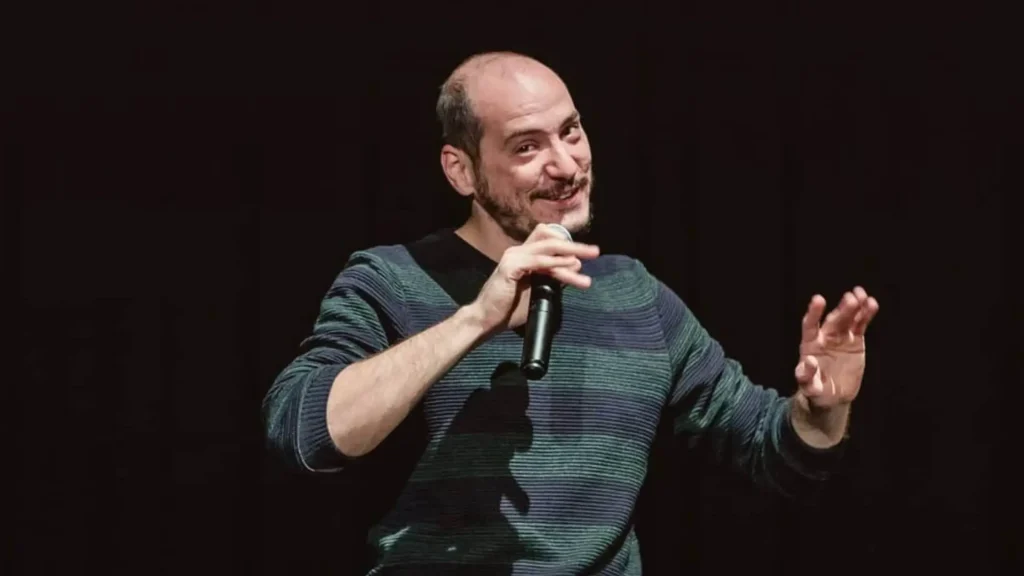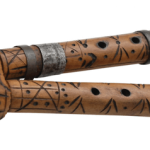In this series, I have the privilege of sharing the local culture through individuals from all walks of life. These are some of the everyday people you may simply pass by while walking down the street. But through these coffee house conversations, I reveal the spark of extraordinariness that lies within.
Today, I’d like Total Croatia News readers to meet Split native – Tomislav Primorac (Tomo), who has generously offered (more like coerced) to kick off this session.
Tomo is a data scientist, who is equally comfortable with artificial intelligence, datasets, and equations, as he is with entertaining people. The first time we crossed paths, it was over peka in the middle of a horse ranch. Despite the language barrier, two things were clear – he knew how to work a crowd, and he was really funny in Croatian.
As it turned out, Tomo had a different side that only came out in the evenings. No, he’s not a vampire but perhaps, equally as mythical, part of Split’s underground but growing stand-up comedy scene. Comedy is such as integral part of our interactions that is woven into the fabric of our everday existance. The best comedians, on the other hand, can be considered the most effective cultural anthropologists and critical thinkers as they explore ideas and subvert norms through the medium of humour.
Read on as we discuss all things from George Carlin to aliens and crabs, his grandmothers as his muses, the importance of creative passions, persistence, and commitment.
So, one of the first things I have to ask is – how does a data scientist get into stand-up comedy?
Yeah, there’s two things. First, there was no stand-up comedy in Split when I started. I mean, there was hardly any stand-up in all of Croatia. There were some people in Zagreb that did it, but it felt more frowned upon than celebrated in Croatia. But as soon as it came to be, people reacted really well. It’s more authentic, you know, when it comes from people from your town, you can relate to it more.
So, I saw that there was an open mic in Zagreb, it was actually better for me to try stand-up in front of people who don’t even know who I am, in a town where I don’t live, then if I fail, nobody knows about it! Fortunately, it was all right, so I continued. This was eight years ago.
But a few years before our (his comedic group) first gig, we were already writing material independently. You have to have this enthusiasm of hoping to do it and even if you’re never going to do it, the whole process of creation is rewarding enough. It’s not like we saw an open mic and said, right, maybe we should try this.
Right, so who are some of the people that inspire your comedy?
First idols, of course, were from England and America where there’s a scene. I think you identify stand-up probably more with America. I think one of the first people that all young comedians idolize is George Carlin, because when you’re in high school, he’s a rock star, a thinker, and a philosopher. So, he’s the first one, for sure.
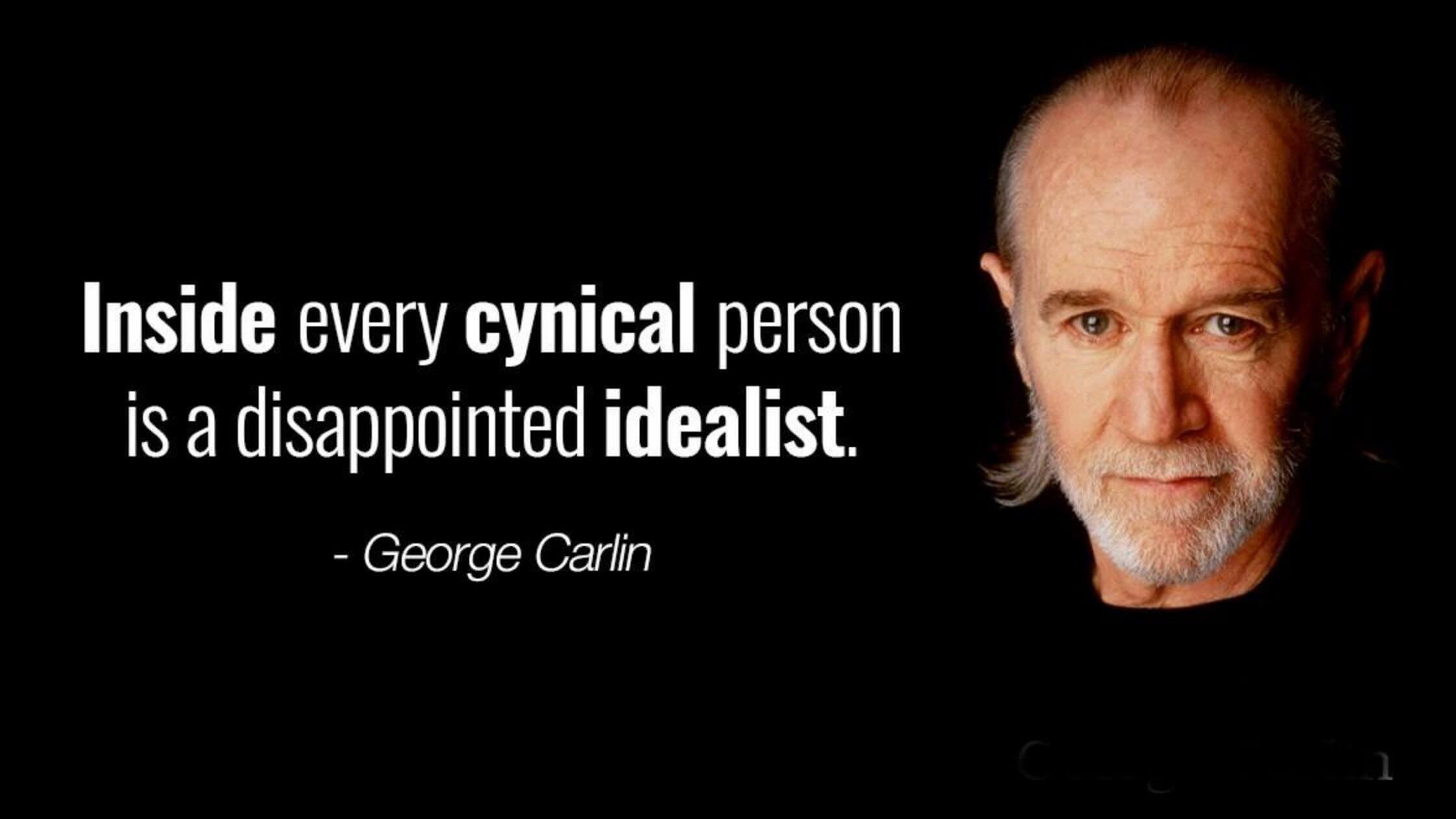
Image: George Carlin/Facebook
As soon as I started doing it, I realized that I can’t do what he does. I’m a beginner, you have to work up to that to get people to respect that you can discuss interesting and serious topics.
You say you actually have to work up to it, how do you mean?
Yeah, you must get the people’s vote, gain credibility. I look at it through two different perspectives. One perspective is technical, you have to get good at making people laugh, talking in front of them and making them listen.
The other thing is, why should they listen to you say something interesting? Who are you? So, you have to develop the confidence and make them believe that you have something interesting to say, and then you actually have to say it!
Right, because the impression of stand-up is you jump on stage and you just ad-lib everything. There’s actually a whole process behind it.
Yes. Your name and your stage persona and stuff like that is a long-term process. In the short term, if you look at one show, you do an hour or so, you can’t just jump to the serious topics.
I mean, I would have to add that in Croatia, I think that the whole stand-up scene and audience is not yet there for us to have a George Carlin you know? People are still just interested in laughing and having a good time.
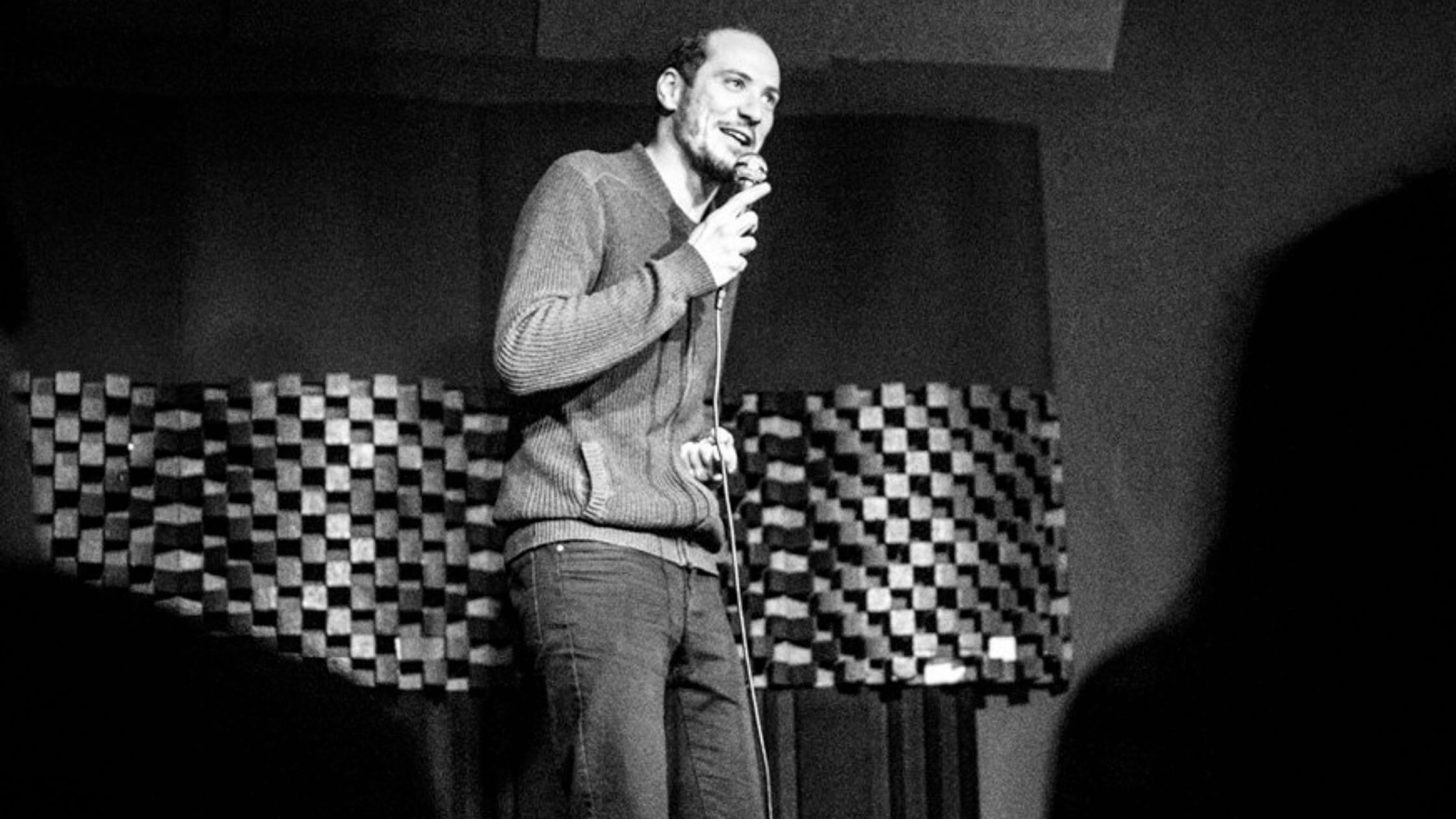
Tomo in his element. Image: Nikola Radovani/Tomislav Primorac Facebook
But why then did you keep this a secret from your own family?
Only when enough local people from Split did it, then I said, okay, now this is not weird anymore because it didn’t even exist as a profession!
When I first traveled from Split to Zagreb to do these shows, it meant everything to me. I’m jealous of my former self because I don’t have this enthusiasm anymore. When I first started it was like, “Oh, my God, I can’t wait to do the show three months from now!”
And if anyone had known this, they’d probably say, “What are you doing? This is stupid!” Because people here, especially in Split, they have this “crabs in the barrel” mentality, which is the thing that I criticize about Split the most.
Is it similar to this saying “frog in a well”, where someone only sees that tiny sky and thinks it’s their world?
Related but it’s when one of the crabs tries to climb out, the others pull it back in! In Zagreb, when you start trying to do something new, it’s fun because it’s a large city. You try to do something different in Split, people are not so open. I think this mentality is changing but when I first started, Split was still closed-minded.
It’s amazing that it was so difficult, but you still managed to find a team of people.
Yeah. At first, it was just me, and then there were two of us. Okay, so this is an important thing, it’s all thanks to a workshop by Marina Orsag, one of the most famous comedians in Croatia. She organized this open mic in Zagreb and when she saw me performing, she said, “Okay, so there’s somebody from Split. Maybe we should do this in Split to see who catches on”, and that’s how all the others came on board. There were a lot of us throughout the years, but only the four of us really stayed together. We’re persistent and committed to the whole.
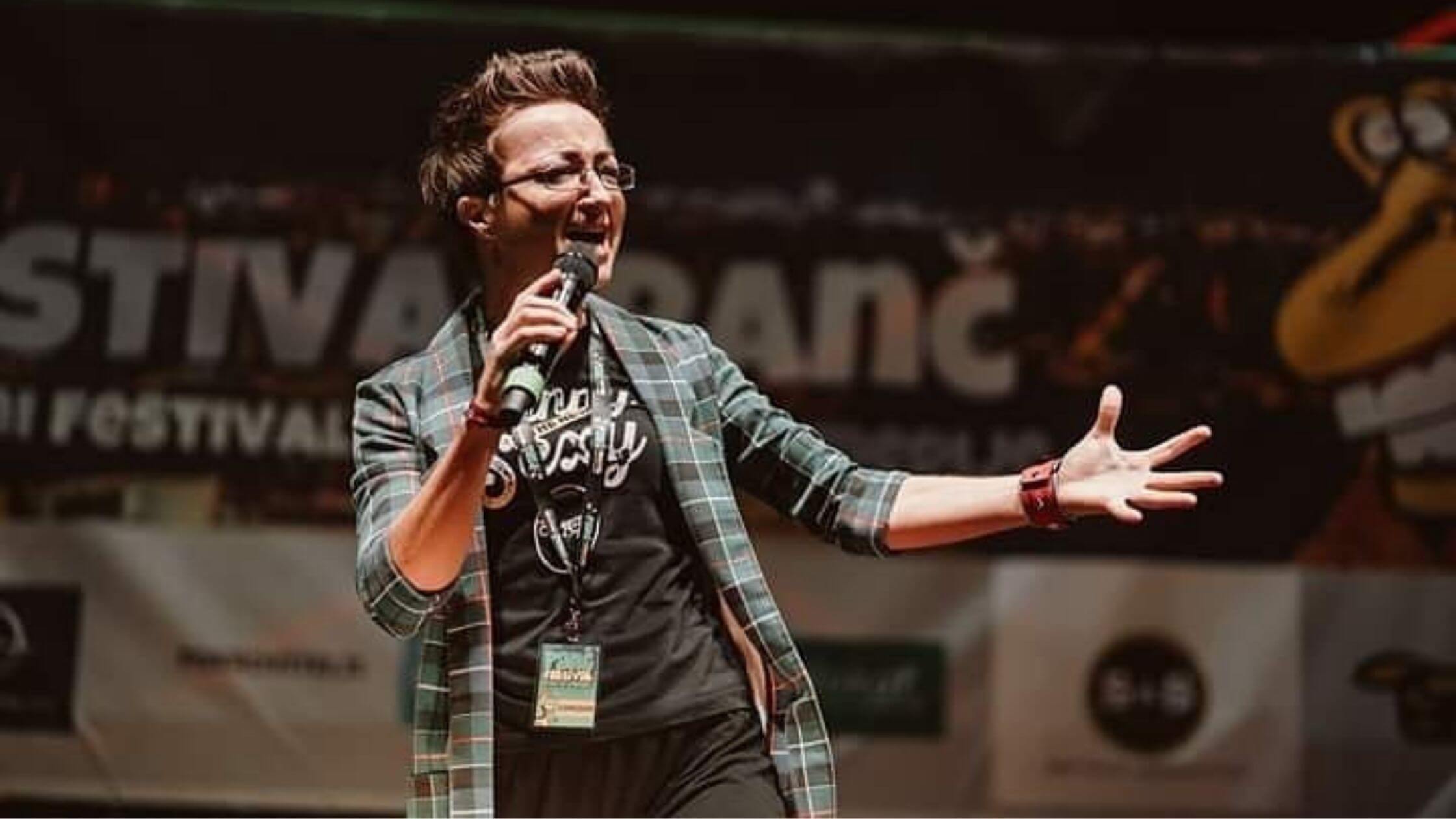
Image: Famous Croatian Comidianne, Marina Orsag. Marina Orsag/Facebook
It’s a huge blessing because like, the four of us, to me, because we have events, we are together all the time, we’re great friends, get along really well and complement each other. We’ve had huge challenges which we overcame, sharing a unique path in life and career. And that’s what brings us together the most.
Only my fellow comedian colleague from Split understand the things I’m going through, psychologically, to understand when I say, it’s not easy to do stand-up. You don’t have a private life; people go out during weekends and evenings and I have to go to do my job. Then your job becomes your personal life. So that’s why we have this deeper connection, because we really share the same but rare experiences
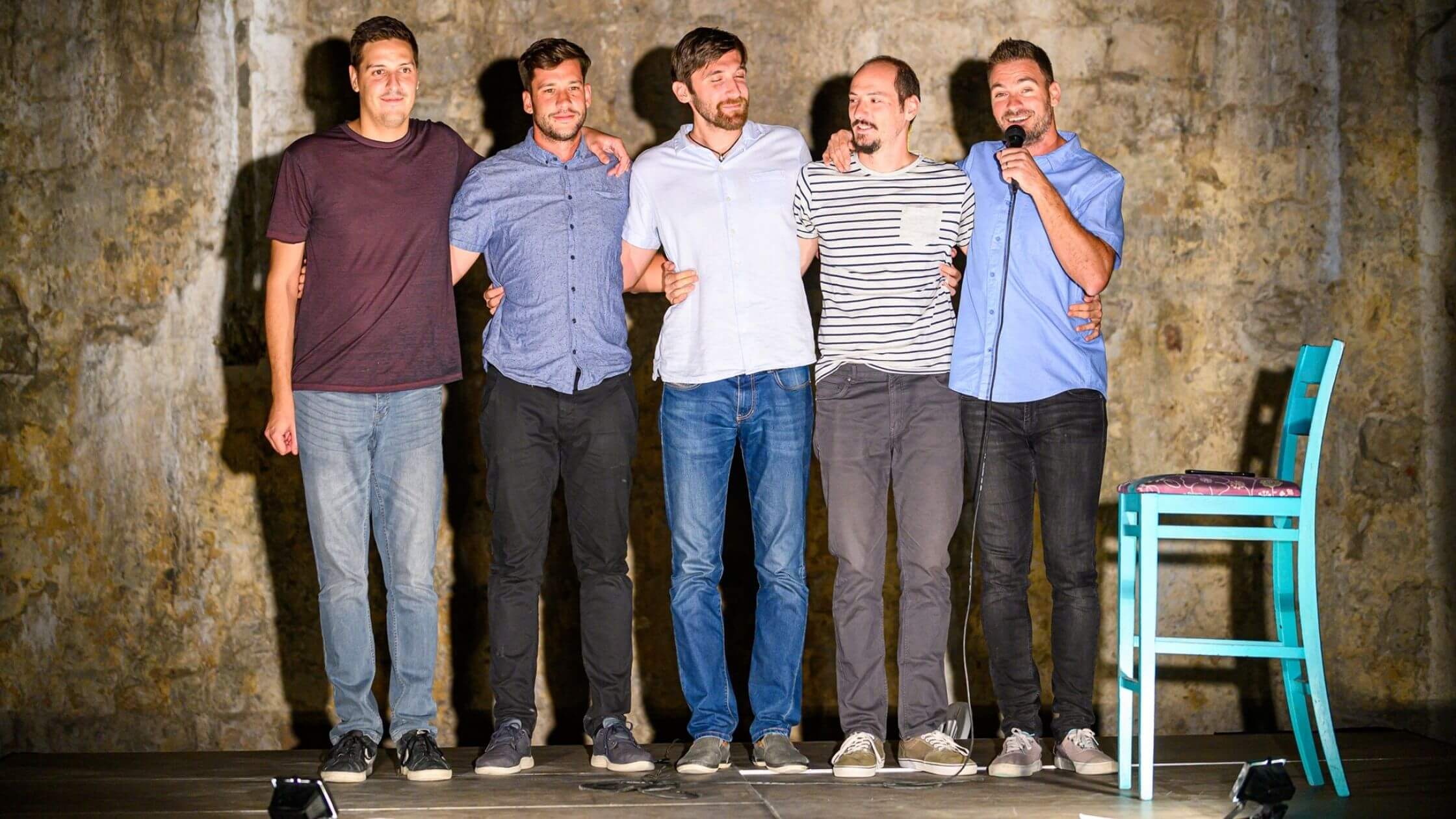
The crew after a show in Trogir’s historical center. Image: Dino Čaljkušić/Visit Trogir Facebook
It’s sort of inspirational to others in a way, that you’ve managed to overcome these setbacks.
I hope we are. A lot of other comedians from different scenes in Dalmatia also started to come up after seeing us. For example, the other day, someone contacted us and asked, “I see you organize your own open mics, can I come?” So, by growing ourselves, we’re also opening new doors for other people. It’s a great process to be a part of.
Do you have any routines that you go through before you get on stage? How do you prepare for a show?
It depends on what type of show it is, you know, some shows I’ve already done 50 times, so I don’t even have to rehearse. Some of them I’m so nervous that I have to look at my notes all the time. I get my notes and then I wait outside the bar or in the car, whatever, I’m going through my material and memorizing and sometimes even adding new things.
But, you know, this is just the technical part – remembering and committing to memory the setting, writing, but the other part is to get the right energy.
How do you decide if you’re going to be more energetic or…
It is tricky, because you have to go from being a comedian to a host, and it depends a lot on the audience. Sometimes you just get on stage, and they start clapping. Okay, so you’re ready. You don’t even have to do anything. And sometimes you just go and then you go, oh come on. Come on. Can I hear you?
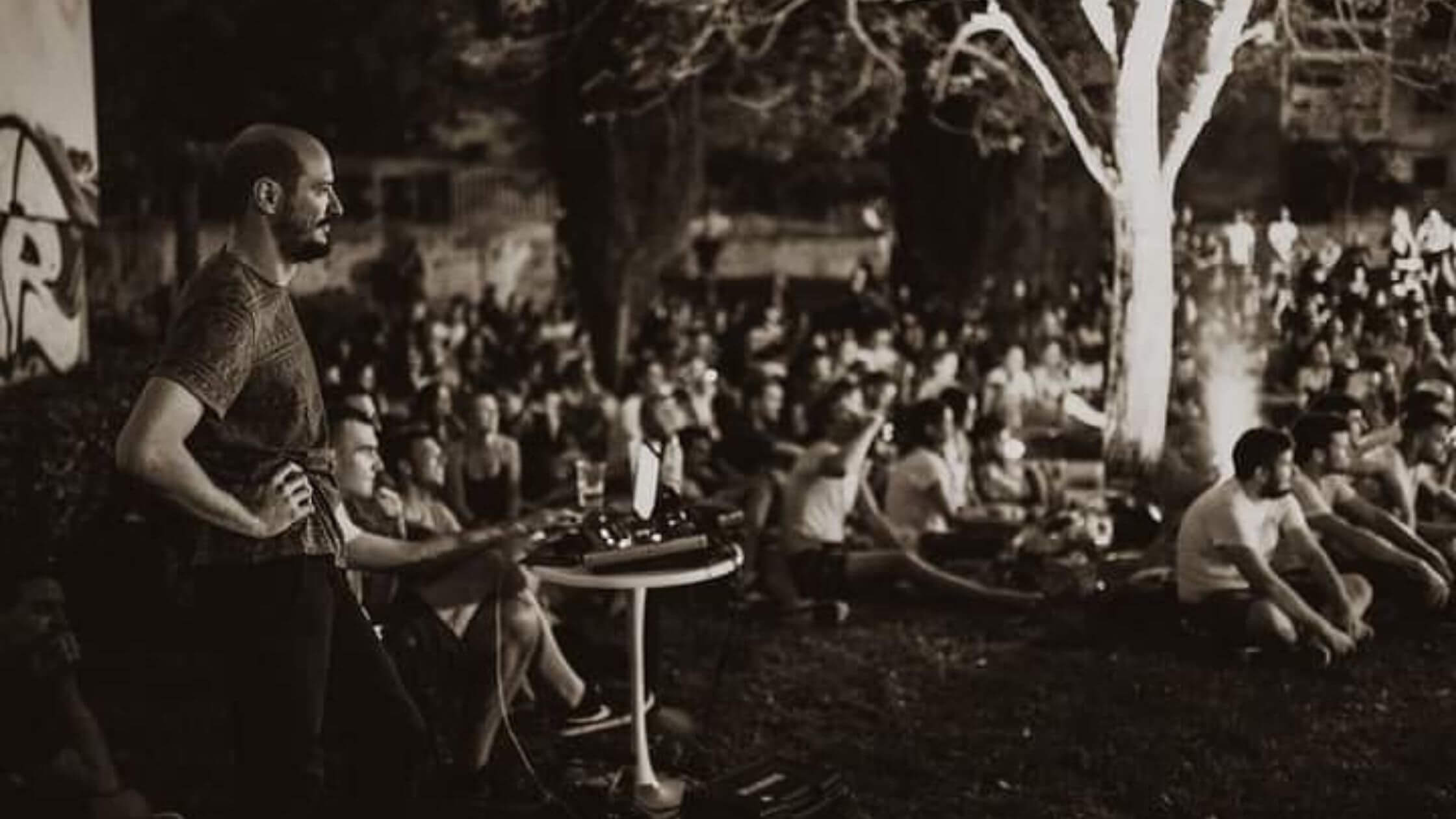
Warming up on the sidelines. Image: Frane Balta/Tomislav Primorac Facebook
So, if you’re just sitting before you have to go on stage, you’re probably just going to be too mellow. So, for me, it helps to drink a little bit before.
Nice, what’s your drink of choice?
Probably beer. It’s probably not a great long-term plan for my liver.
Yeah, it kind of breaks down your own personal barriers, makes you a little more comfortable and you’re not overthinking
Yes, yes. Yeah. That’s exactly it!
Right, so what kind of comedy or routines do tend to drift towards?
A lot of my observational humor is actually similar to Jerry Seinfeld, how people behave, how they interact. What I also get from George Carlin is the analysis of language, a reflection of how people communicate to each other.
A lot of times we don’t know how weird our actions are…
Yeah, I mean, if you want to be an observational comedian and notice things about the world, sometimes you have to be like an alien, you know? Watch how people behave, how they communicate and gestures. These are the things that you notice, if you have the ability to alienate yourself.
I notice you also like joking about your family members
That’s another interesting thing that I noticed, the communication gap between generations. So, my interaction with my nephew as a kid, gives you a look at how different we are, and what humor can be drawn from this difference in age.
So, I really like to talk about me versus my mother, and me versus my grandmother, and when you have this generational gap, you can extract a lot of humor out of it. These are normal human interactions, but I find a lot of inspiration in this.
Give me an example
I like to use my grandmother because she’s always really excited to see me. You know, sometimes I visit just to feel the excitement of somebody seeing me, because your grandmother really just loves you.
The best example of how much she loves is that she thinks I’m beautiful. “Look at him how pretty he is”. As if I was an actor, you know?

Tomo and his muses. Image: Tomislav Primorac/Facebook
Like Brad Pitt?
Probably more like someone from a documentary.
Do you have any plans to do a show in English?
We tried to do this maybe four years ago. And then I decided not to continue because there’s a lot of challenges in performing in English and in performing for other audience, because humor is so contextualized
Yes, it is.
And a lot of it that you think it’s not contextualized, really is. For example, I can speak about my mother in Croatia, and they will get it in Serbia, Bosnia and Herzegovina, Montenegro, and Slovenia. But if I try to talk about my mother in front of a global audience, they don’t have the same mother as we do here!
Also, a lot of humor is also about language which doesn’t really work in English. And then there’s the biggest challenge if I don’t have a good flow.
Right, if you’re not confident it’s going to show that people will really pick up
Yeah, I would really have to practice.
Ok before letting you go, what is one of your favorite or most memorable shows you’ve ever done and why?
Probably the first time I did my one-man show, four years ago, because after four or five years of doing stand-ups, I finally managed to gather enough material and courage to do my own thing.
And people were really, REALLY supportive. A lot of friends in the audience and I got a lot of love from them. And that is the first time I really felt like, this is really good, I get to perform, and I get to be in front of people who appreciate it.
That was really one of the most beautiful feelings ever, you know, if you’re just doing a show, and you have a feeling that you’re something that’s valuable, right?
Indeed, Tomo, well said.
If you want to get to know Tomo more and his upcoming shows, check out his page.
For more, check out our lifestyle section.

